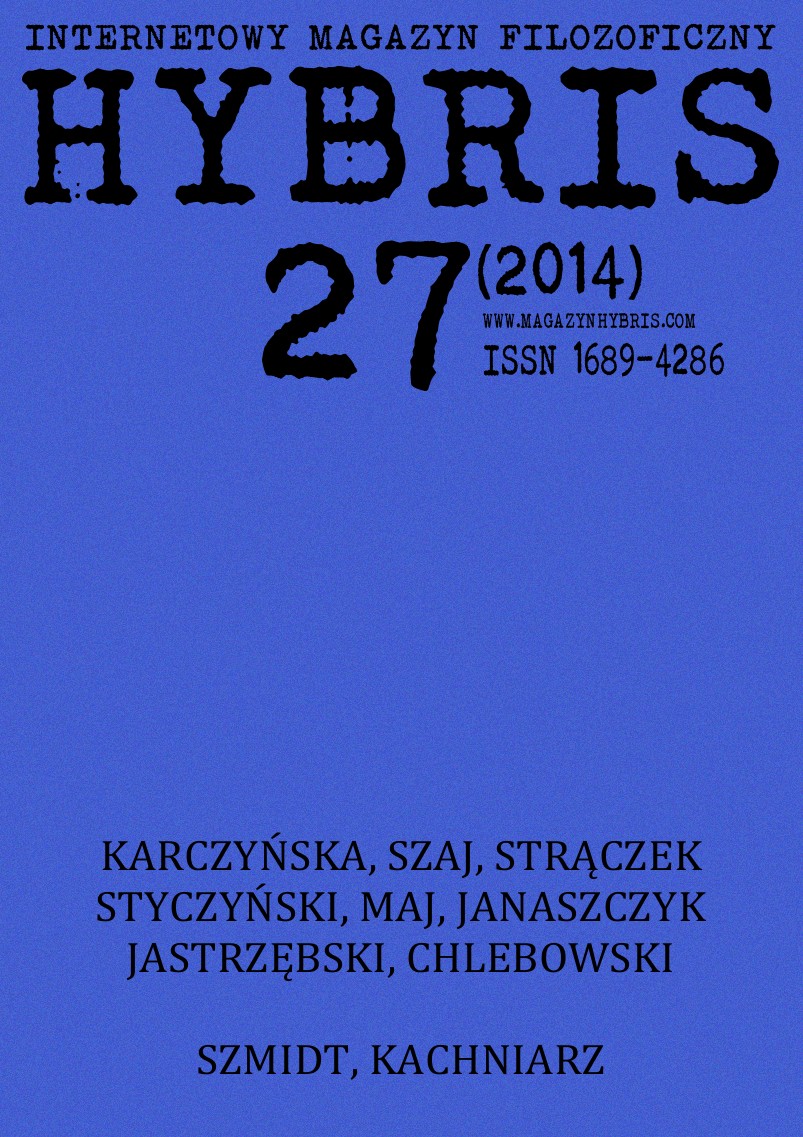Critique of the arab mind. Contemporary arab thought in the context of the issues of reason and cognition
DOI:
https://doi.org/10.18778/1689-4286.27.01Abstract
In this article I will present different stands of Arab scholars with respect to one of the key issues of Orientalism — the Arab mind. The assumption of individuality and invariable nature of Arab mind was one of the foundations of the oriental thought. With the development of postcolonial thought in the second half of the 20th century, some Arab scholars rejected this assumption, while the others tried to redefine its essence. Hence, the study of such issues as reason and cognition was so important. According to Mohammad Abed Al-Jabri, what distinguishes Arab reason is the fact that in Islamic philosophy the connection between epistemology and ideology was much stronger than in the European culture. As a result, Islamic philosophy used epistemology and logic not for the sake of uncovering the ‘truth’, but in the defence of its own ideological claims. Al-Jabri argues that in order to understand contemporary Arab-Islamic thought it is necessary to study its beginning (VII–IX centuries AD), since instruments of reason established in that period have remained until today. Other philosophers, like Mohammed Arkoun place Arab reason in wider context of reason as such. The knowledge of the way of cognition within Arab culture seems to be the key to understanding of their world.
References
Abed, S. B., 2002, Language, [w:] S. H. Nasr, O. Leaman (red.), History of Islamic Philosophy. Part II, London: Routledge.
View in Google Scholar
Abu-Rabi, I., 2004, Contemporary Arab Thought. Studies In Post-1967 Arab Intellectual History, London: Pluto Press.
View in Google Scholar
Abu-Rabi, I., 1996, Intellectual Origins of Islamic Resurgence in the Modern Arab World, New York: SUNY Press.
View in Google Scholar
Abu-Rabi, I., 2003, Toward a Critical Arab Reason: The Contributions of the Moroccan Philosopher Muhammad Abid al-Jabiri, Islamabad: Islamic Research Institute.
View in Google Scholar
Ajami, H., 2012, Deconstruction of the Arab-Islamic Mind, http://www.ahewar.org/eng/show.art.asp?aid=1573 (dostęp z dnia 03.09.2012).
View in Google Scholar
Al-Azm, S. J., 2010, Orientalism, Occidentalism, and Islamism: Keynote Address to “Orientalism and Fundamentalism in Islamic and Judaic Critique:A Conference Honoring Sadik Al-Azm”, [w:] “Comparative Studies of South Asia, Africa and the Middle East”, 30 (2010).
View in Google Scholar
DOI: https://doi.org/10.1215/1089201x-2009-045
Al-Jabri, M. A., 2011, The Formation of Arab Reason. Text, Tradition and the Construction of Modernity in the Arab World, London: I.B.Tauris & Co. Ltd.
View in Google Scholar
DOI: https://doi.org/10.5040/9780755610617
Arvanitis, R., Waast, R., Al-Husban, A. H., 2010, 2010 World Social Science Report. Knowledge Divides. Background paper. Social sciences in the Arab world , UNESCO Publishing / International Social Science Council, http://unesdoc.unesco.org/images/0019/001906/190653E.pdf (dostęp z dnia 03.09.2012).
View in Google Scholar
Gunther, U., 2005, Mohammed Arkoun: Towards a Radical Rethinking of Islamic Thought, [w:] S. Taji-Farouki (red.), Modern Muslim Intellectuals and the Qur’an, Oxford: Oxford University Press.
View in Google Scholar
Hamarneh, W., 1999, Introduction, [w:] M. A. Al-Jabri, Arab-Islamic Philosophy. A Contemporary Critique, Austin: The University of Texas.
View in Google Scholar
Hanafi, H., 2010, From Orientalism To Occidentalism, [w:]“Ishraq: Islamic Philosophy Yearbook”, 1 (2010).
View in Google Scholar
Hersh, S. M., 2004, The Grey Zone. How a Secret Pentagon Program Came to Abu Ghraib, [w:] The New Yorker, 24.05.2004, http://www.newyorker.com/archive/2004/05/24/040524fa_fact?currentPage=4 (dostęp z dnia 03.09.2012).
View in Google Scholar
Kassab, E. S., 2010, Contemporary Arab Thought: Cultural Critique in Comparative Perspective, New York: Columbia University Press.
View in Google Scholar
Khouri, M. A., 1988, Criticism and the Heritage: Adonis as Advocate of the New Arab Culture, [w:] G. N. Atiyeh, i M. Oweiss (red.), Arab Civilization. Challenges and Responses. Studies in Honor of Constantine K. Zurayk, New York: SUNY Press.
View in Google Scholar
Leaman, O., 2004, Krótkie wprowadzenie do filozofii islamu, Warszawa: Aletheia.
View in Google Scholar
Lockman, Z., 2004, Contending Visions of the Middle East: The History and Politics of Orientalism, Cambridge: Cambridge University Press.
View in Google Scholar
DOI: https://doi.org/10.1017/CBO9780511606786
Mahdi, M., 1970, Language and Logic in Classical Islam, [w:] G. E. von Grunebaum (red.), Logic in Classical Islamic Culture, Wiesbaden: Harrassowitz.
View in Google Scholar
Smith, L., 2004, Inside The Arab Mind. What’s Wrong with the White House’s Book on Arab Nationalism, [w:] Slate, 27.05.2004, http://www.slate.com/articles/news_and_politics/foreigners/2004/05/inside_the_arab_mind.single.html (dostęp z dnia 03.09.2012).
View in Google Scholar
Wardeh, N. M., 2010, From Ali Ahmad Said to Adonis: A Study of Adonis’s Controversial Position on Arab Cultural Heritage (turath), [w:] “Asian Culture and History”, 2 (2010).
View in Google Scholar
DOI: https://doi.org/10.5539/ach.v2n2p189
Zayd, N. A., 2006, Reformation of Islamic Thought Scientific Council For Government Policy. A Critical Historical Analysis, Amsterdam: Amsterdam University Press.
View in Google Scholar
Downloads
Published
How to Cite
Issue
Section
License

This work is licensed under a Creative Commons Attribution-NonCommercial-NoDerivatives 4.0 International License.






